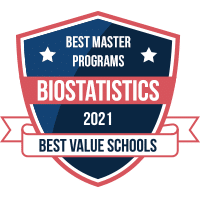
Earning a masters in biostatistics prepares a professional to expand their career into one of the fastest-growing careers in the U.S. The thought of becoming a biostatistician may seem somewhat intimidating to some people that are not clear about what is required of this particular profession.
Gaining insight into the career field, and learning about the top master’s degree programs in biostatistics likely helps to prepare individuals to work in the highly-specialized field.
Top 5 Masters in Biostatistics Programs
| Rank | School | Location |
|---|---|---|
| 1 | University of Nevada Reno | Reno, Nevada |
| 2 | Florida State University | Tallahassee, Florida |
| 3 | University of Cincinnati | Cincinnati, Ohio |
| 4 | Ohio State University | Columbus, Ohio |
| 5 | University of Washington | Seattle, Washington |
What Do I Need to Know about a Career in Biostatistics?
The first step to considering a career in biostatistics involves knowing the definition and scope of the career. The School of Public Health at the University of Washington explains that biostatisticians develop, and then apply statistical methods to both health and biomedical data. The Johns Hopkins Bloomberg School of Public Health describes the field as a scientific approach that involves the reasoning and the methods for using data as the evidence to address questions related to biomedicine and public health.
The American Statistical Association identifies biostatistics as a field concerned with obtaining, analyzing, and interpreting data by using statistical theory and methods in order to address problems that exist in the biological and health sciences. These descriptions allows prospective students to have the opportunity to select the school and program that best corresponds to their biology career goals.
The Bureau of Labor Statistics (BLS) lists an astounding 33 percent, much faster than average expected job growth rate for statisticians through 2029, with a median 2019 salary of $92,030. These best master’s in biostatistics programs offer ideal opportunities for graduates to start or advance their career in this expanding, well-paying field.
Best 15 Masters in Biostatistics
University of Nevada Reno
The 36-credit hour Master of Science in Biostatistics program at the University of Nevada prepares students for careers as biostatisticians. Students learn the skills that are required to plan and to conduct quantitative analysis in public health, biomedicine, and biology. The rigorous curriculum places emphasis on the knowledge and skills necessary to excel in a career as a biostatistician.
Students have the benefit of small class sizes, and the opportunity to work with faculty.
School Overview
Florida State University
Students that want to earn a Master of Science in Biostatistics at Florida State University pursue a rigorous 36-credit hour program. The curriculum consists of courses that focus on the application of statistical principles, processes, applications, and the analytic methods that are required for designing, implementing, and analyzing health-related studies.
Students complete courses such as Statistical Inference, Statistics in Applications, and Epidemiology for Statisticians.
School Overview
University of Cincinnati
Students enrolled in the Master of Science in Biostatistics program at the University of Cincinnati want to gain an advanced knowledge of the application and theory of biostatistics. Graduates of the program have the skills to select and to use the appropriate statistical analysis software for assessments, decision-making and information-sharing. They also clearly communicate statistical methods and findings to a variety of audiences.
School Overview
Ohio State University
The Ohio State University offers a Master of Science in Biostatistics through the school’s College of Public Health. The university recommends that students prepare for the program by having a good foundation in mathematics, with at least a first course in probability and statistics.
The 45-credit hour program focuses on four curricular domains, including the core requirements in public health, biostatistics specialization courses, elective courses, and a thesis. Examples of courses include Design and Analysis of Studies in the Health Sciences, Practical Biostatistics for Biomedical Laboratory Researchers, and Stochastic Epidemic Models.
The school also offers a PhD in Interdisciplinary Biostatistics program for students that wish to further their education after completing this program.
School Overview
University of Washington
The Master of Science in Biostatistics program at the University of Washington prepares students for a career as a biostatistician, a data analyst, or as a research scientist.
Students that enroll in the Master of Science Capstone option plan to work immediately after graduation. The fast-paced, 18-month program provides students with expertise in their choice of three specializations. Students choose either the Data Science, the Statistical Genetics, or the Modeling and Methods option.
Students enrolled in the Master of Science Thesis option plan to earn a doctoral degree or to work in a research position in either a biomedical, clinical, or laboratory setting. Graduates typically gain employment at universities, scientific start-up companies, public health organizations, or at private companies.
School Overview
University of Minnesota
Students enrolled in the Master of Science in Biostatistics program at the University of Minnesota engage in the process of designing biomedical studies, and analyzing data. They put the results in context for researchers across different fields. The school recently revised the program curriculum, which consists of courses such as Theory of Statistics, Advanced Programming and Data Analysis, and Spatial Biostatistics.
School Overview
Johns Hopkins University
Johns Hopkins University is home to the oldest biostatistics department in the world. The university offers three biostatistics programs, including the Master of Science in Biostatistics. The program is designed for students that have demonstrated excellence in their undergraduate studies in quantitative or biological sciences. The program typically takes two years to complete, and consists of didactic coursework and a master’s thesis project.
Graduates gain positions in research, or in a variety of professional settings.
School Overview
Drexel University
Drexel University offers the only program of its kind based in a school of public health in Eastern Pennsylvania. Students that graduate with a Master of Science in Biostatistics degree from the university have the opportunity to immediately contribute to the public health and biomedical industries.
The program curriculum focuses on topics such as demonstrating mastering theory of statistical methods, applying research design principles to problems in public health, and understanding and implementing innovative statistical approaches. The curriculum also prepares students to have other skills that are necessary for a career in biostatistics.
GRE scores are not required to apply to this program.
School Overview
Tulane University
The School of Public Health & Tropical Medicine at Tulane University offers a 42-credit hour Master of Science in Biostatistics program that prepares graduates for careers as statisticians or for careers in academia. The program prepares students to work in the profession through a curriculum that focuses on mathematical statistics and probability theory, epidemiology, stochastic processes, applied and theoretical multivariate methods, and other areas that provides graduates with expertise in biostatistics.
School Overview
University of Utah
The University of Utah houses its Biostatistics program within the Department of Family and Preventive Medicine in the School of Medicine. The program provides students with a solid foundation in the basics of applied statistics, the ability to apply statistical knowledge to health-related data, and the fundamentals of various problems in the area of health, along with other skills.
The 37-credit hour program consists of courses such as Categorical Data Analysis, Public Health and Clinical Research Methods, and Linear Regression and Tools of Multivariate Analysis.
School Overview
George Washington University
The Master of Science in Biostatistics program at George Washington University is jointly administered by the Department of Statistics, and the Department of Biostatistics and Bioinformatics at the George Washington Milken Institute School of Public Health. Students gain the knowledge and skills that are required to excel in the biological, the biomedical, and the health services sciences.
Graduates have an understanding of the theory and principles of the statistical methods that are commonly used in biomedical research. They have the knowledge to apply underlying principles and methods to design, plan, and conduct biomedical studies. Students complete courses that cover topics such as biostatistical methods, survival analysis, statistical genetics, public health genomics, and bioinformatics algorithms and data structures.
The university also offers a PhD in Biostatistics program.
School Overview
Columbia University
The Columbia University Mailman School of Public Health offers a Master of Public Health in Biostatistics program that is designed to enhance the quantitative skills of current public health practitioners that frequently use statistics in their work duties. Students use and adapt statistical procedures for health and medical care programs. Other professionals that likely benefit from this program include practitioners that serve in a technical capacity as resource personnel, or collaborators in field and programmatic studies.
The university explains that graduates will be able to interpret quantitative findings in accurate, and accessible language for colleagues outside of the biostatistics field, and for dissemination to the public. Graduates have the knowledge and skills to explain the general principles of study design in an attempt to identify risk factors for disease, to isolate targets for prevention, and to assess the effectiveness of one or more interventions. There are other outcomes that prepare graduates to excel in their profession.
School Overview
Boston University
The Boston University Master of Science in Applied Biostatistics program prepares graduates to assume challenging career positions in this evolving field. Students learn to work with multidisciplinary teams that focus on designing, analyzing and summarizing data from a variety of sources. The comprehensive one-year program prepares students to apply statistical methods used in biomedical research and to provide biostatistical advice as a member of a team with diverse skills.
Gain the skills and knowledge necessary to work in biostatistics through courses such as Multivariable Analysis for Biostatisticians, Applied Statistics in Clinical Trials, and Bayesian Modeling.
All 100 percent of the 2019 graduates obtained employment within six months of graduation.
School Overview
University of Southern California
The Keck School of Medicine is home to the Master of Biostatistics degree program at the University of Southern California. Students that are interested in gaining skills related to applying statistical methods to the design and analysis of biomedical research and clinical investigations data likely thrive in the program. Students gain knowledge in theory, experimental design, and data analytic methods. Graduates also have the skills to understand statistical methods in human genetics, and advanced computing methods related to statistics in the 39-credit hour program.
School Overview
University of Miami
The Master of Science in Applied Biostatistics degree at the University of Miami is a newer program that is designed specifically for quantitative students that want training in applied biostatistics. The 33 credit-hour, one-year program is a terminal degree that provides students with a background that is required for the application of proper biostatistical practices in today’s real-world settings.
Students are able to immediately apply their knowledge and skills to various data settings, including biological life sciences, public health, health services research, and medical studies.
School Overview
Our Ranking Methodology
We searched colleges and universities that offer a Masters in Biostatistics program, and then compiled a final list of the best schools that offer the degree. We ranked the schools in ascending order, providing accreditation and tuition information.
The tuition rate covers the cost of one credit hour of instruction. It does not cover fees or other costs, such as supplies, or the additional tuition rate sometimes charged to students that are non-residents of the state.
Would you like assistance finding the right online college or university? We can help you, based on the program that you select.
Please contact us if you would like to have your school included in our rankings, or if you need to update the information that we have for your school.


